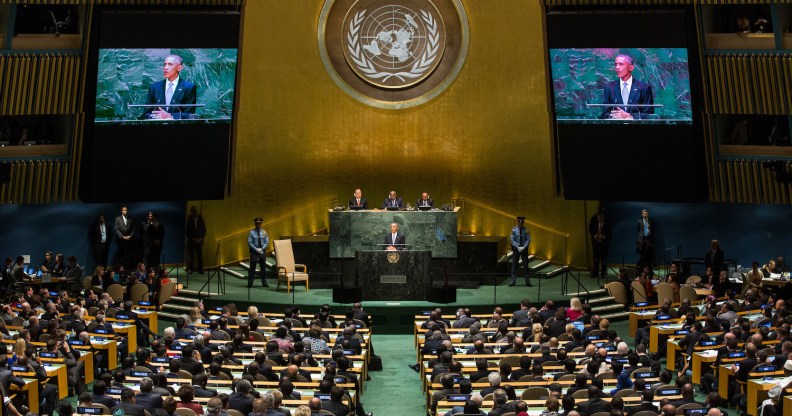Egyptian UN envoy boycotts measures to curb anti-gay violence

The United Nations’ choice to be its first ever monitor against anti-LGBT violence has been unveiled, but an Egyptian ambassador has boycotted the process.
Thai law professor Vitit Muntarbhorn was unveiled as the new monitor by a five-member human rights committee.
The Bangkok professor has held previous posts at the UN will monitor against anti-LGBT violence.
But the Egyptian ambassador refused to participate in the selection process for the post.
The ambassador, Amr Ramadan, wrote a letter saying fighting against anti-LGBT discrimination is “contrary to my convictions and the values I stand for”.
Going on, he said the post was “beyond universally recognized human rights and fundamental freedoms,” and added that it goes “utter disregard to the principle of universality of internationally agreed human rights.”
Ramadan reiterated that the OIC, the Islamic bloc of 56 UN member states, would continue to attempt to block the appointment.
He wrote that the OIC ”shall boycott this mandate and shall not recognize its creation nor cooperate or interact with it in any form.”
Hillel Neuer, the executive director of UN Watch, a Geneva-based human rights group, said: “The Islamic states’ boycott of a mandate to protect gays from being attacked or killed is morally indefensible.
“Moreover, for those states which are members of the Human Rights Council—like Saudi Arabia, Qatar, and UAE—their refusal to cooperate with the mandate is an express breach of their obligations.”
“If Egypt is officially boycotting a UN human rights expert, it should fully resign from the committee that selects them,” said Neuer.
The United Nations (UN) last month voted to create its first ever LGBT rights watchdog.
Passed with 23 votes to 18, with 6 abstentions, the measure ensures that an appointed member will monitor “violence and discrimination based on sexual orientation and gender identity.”
Language used in the resolution suggests that LGBT rights should be the concern of human rights laws across the world.
Previously the UN has voted on two resolutions for LGBT rights, but those passed only to urge the organisation to prepare reports specifically about LGBT issues.
The UN has previously only rarely mentioned LGBT issues, and last year the UN Security Council made history by addressing such issues for the first time.
A meeting, behind closed doors, was addressed by a Syrian refugee who escaped threats from ISIS.
More recently the Security Council issued a press statement condemning the mass shooting at Orlando’s Pulse gay club.

